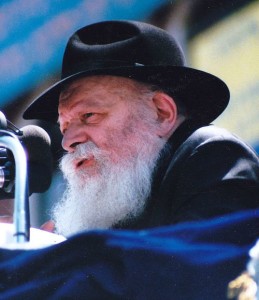By Rabbi Shmuly Begun


SAN DIEGO —Tomorrow, Tuesday, July 9th, marks the 30th anniversary of the passing of the Lubavitcher Rebbe, Rabbi Menachem Mendel Schneerson. The following poignant story illustrates his extraordinary leadership.
A snowy New York evening in 1960 found Rabbi Yosef Wineberg, a globetrotting fundraiser for Chabad educational institutions, fielding a call from a Jew in Oklahoma. The man urgently requested Rabbi Wineberg to submit a question to the Rebbe on his behalf, and wanted an immediate answer despite the late hour.
The Rebbe’s correspondence was voluminous. Requests for advice and blessings flooded in from all over the world. The daily mail delivered to his office at 770 Eastern Parkway was exceeded only by the White House.
Knowing Rabbi Hodakov, the Rebbe’s chief secretary, had already brought in the final batch of mail, Rabbi Wineberg thought of an idea. He slipped the envelope containing the Oklahoman’s question between the door and the doorpost, hoping the secretary would see it on his way out of the Rebbe’s office.
Disappointment washed over Rabbi Wineberg as he saw the envelope miss Rabbi Hodakov’s gaze and fall to the floor. But just fifteen minutes later, he was shocked to receive a call from Rabbi Hodakov with the Rebbe’s response to the Oklahoman’s question. It dawned on Rabbi Wineberg that the Rebbe himself must have noticed the envelope and bent down to pick it up.
Rabbi Wineberg, filled with remorse, wrote an apology note to the Rebbe for bypassing standard channels and causing him the inconvenience of picking up the note. The Rebbe’s reply offered comfort: “There is no need to apologize, for my entire raison d’être is to uplift — especially those whom others overlook.”
The Rebbe’s mission was to empower the voiceless, uplift the forgotten, and shine a light on the unnoticed. He believed in the inherent goodness of every person, regardless of their circumstances. He saw the hidden strengths we carry within our challenges.
In 1976, the Rebbe met with a group of Paralympic athletes, many of them wounded Israeli soldiers who had come to North America to compete in the Toronto Paralympics. In his talk, the Rebbe rejected the term “handicapped.” On the contrary, he saw these individuals as uniquely blessed by the Creator possessing remarkable qualities beyond those of the average person, allowing them to be living examples of joy and self-confidence. “Therefore,” the Rebbe said, “They should be called what they truly are: exceptional.”
The Rebbe believed autistic children possess unique strengths and untapped potential. In a written response to an individual who asked the Rebbe what the purpose of special needs individuals are, the Rebbe responded, “Human experience is replete with examples of individuals who have been severely limited in some aspects, yet they subsequently excelled and made great extraordinary contributions to society in other aspects. I am quite convinced that if a proper system of aptitude tests were instituted to determine the particular skills of our special children at an early age, and appropriate classes were established to enable them to develop these skills, the results would be enormously gratifying, if not astounding. Needless to say, such an educational method would greatly enhance their self confidence and general development, not to mention also the fact that it would enable them to make an important contribution to society.”
The Rebbe believed in the prisoner, He viewed imprisonment as an opportunity for personal growth, not simply punishment. In December of 1978, just days before Chanukah, the Rebbe had a conversation with a chaplain from South Africa. After learning that the prison inmates wouldn’t be allowed to light the menorah, the Rebbe said, “How important it is for a person sitting alone in a cell to light a Chanukah menorah! One cannot fathom the warmth and hope this brings, and how this will uplift his spirits in such a dark environment.” Despite the significant time difference (it was 4:00 a.m. in South Africa), the Rebbe instructed the chaplain to connect with the appropriate authorities to ensure the inmates could celebrate Chanukah properly.
On this 30th anniversary, let us carry the Rebbe’s message forward. Let’s seek out those who feel unseen or unheard. Let’s empower the voiceless and uplift the forgotten. By doing so, we can create a brighter world where everyone has the opportunity to shine.
The Rebbe’s interaction with autistic children
*
Rabbi Shmuly Begun is spiritual leader of Chabad of Tierrasanta